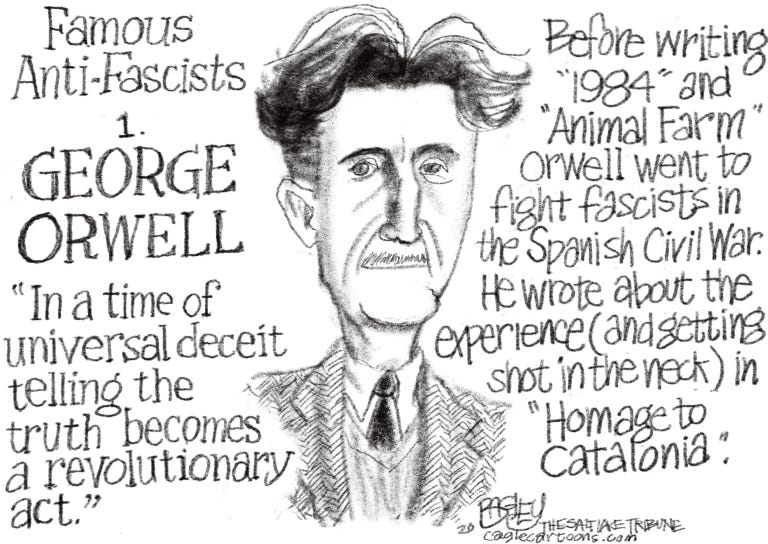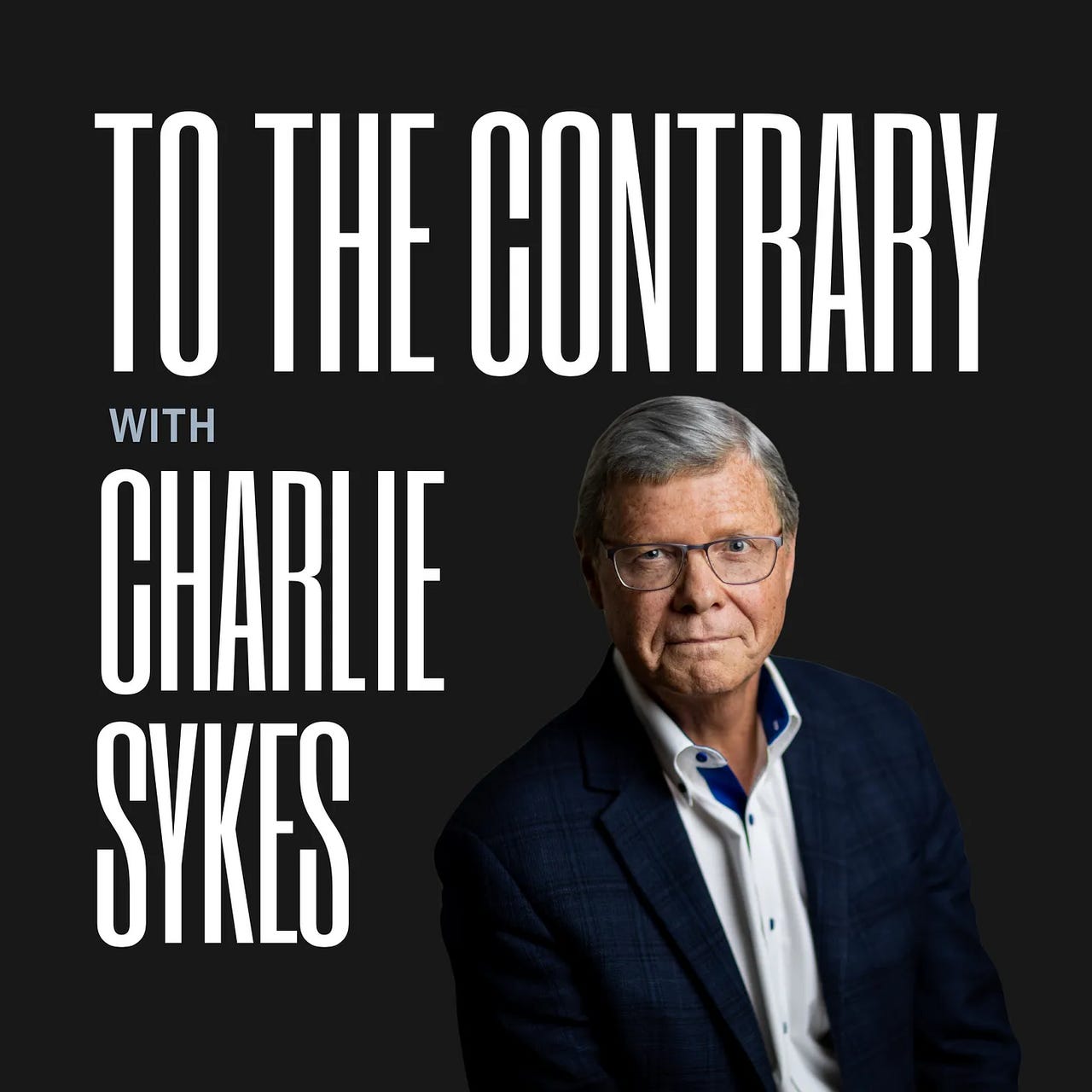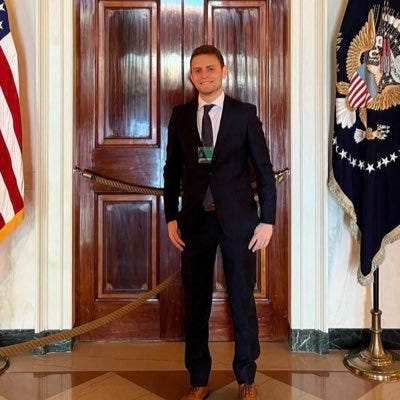“Every generation imagines itself to be more intelligent than the one that went before it, and wiser than the one that comes after it.” ~ George Orwell
When I was in high school (or was it college?) one of the required reading books was Animal Farm. At the time, I didn’t fully appreciate the message or the novel. In fact, I didn’t really enjoy reading the book that much. Maybe I didn’t understand it at the time.
Since Trump rode down the golden escalator ten years ago, I’ve been reading a LOT of George Orwell quotes. They seem to appear regularly on clothing items, protest signs and social media. Just last week a friend showed me his new hat:
When I realized that today was George Orwell’s birthday, curiosity took hold and I wanted the answer to this question: So, who was George Orwell?
“If liberty means anything at all, it means the right to tell people what they do not want to hear.” ~ George Orwell
I Googled “George Orwell” and this is what came back:
George Orwell, was the pen name of Eric Arthur Blair born on June 25, 1903. He was an English novelist, essayist, journalist, and critic. He is best known for his influential novels Animal Farm and 1984, which are considered classics of modern political satire and dystopian literature, respectively. These novels warn against the dangers of totalitarianism and explores themes of freedom, truth, and surveillance. They have had a lasting impact on popular culture and political discourse.
Key Aspects of Orwell's Life and Work:
Democratic Socialism: Orwell was a self-described democratic socialist, believing in social justice and economic equality while preserving personal freedom. He was critical of both authoritarian communism (like Stalinism) and fascism.
Anti-Totalitarianism: A central theme in Orwell's work is his strong opposition to totalitarianism and the dangers of unchecked state power, surveillance, and the manipulation of truth.
Lucid Prose and Social Commentary: Orwell's writing is known for its clear, concise style and sharp social criticism. He believed in using language to reveal truth rather than conceal it.
Influential Non-Fiction: Beyond his novels, Orwell's non-fiction works like The Road to Wigan Pier (documenting working-class life) and Homage to Catalonia (about his experiences in the Spanish Civil War) are highly regarded for their social commentary and exploration of political ideas.
"Orwellian" Legacy: His work gave rise to the adjective "Orwellian," which describes totalitarian and authoritarian social practices. Several terms from 1984, such as "Big Brother," "Thought Police," and "Newspeak," have entered common usage.
Personal Experiences: Orwell's writing often drew upon his personal experiences, such as working as a colonial police officer in Burma, living in poverty in Paris and London, and fighting in the Spanish Civil War.
George Orwell's work remains highly relevant for its insights into political philosophy, epistemology, and the critical importance of clear language and truth in a free society.
I read through his profile on Wikipedia and suffice to say he led a very interesting life. For example, he spent five years “going native” living in relative poverty in both London and Paris, so that he might be able to understand the life of someone, who is underprivileged.
His life was cut short by tuberculous when he died in 1950. Though Orwell was already a respected writer due to Animal Farm and 1984, his early death meant he never saw the full cultural impact of his books especially 1984. It is considered one of the most influential novels of the 20th century.
Several key events in George Orwell’s life deeply shaped his worldview and influenced his writing style and themes. Here are the most significant ones:
As a very young man, between 1922-27, Orwell worked as a British colonial officer in what is now Myanmar. The firsthand experience of imperialism left him disillusioned with the British Empire. He wrote about it Burmese Days and in essays like Shooting an Elephant. His works critiqued imperialism and showed his internal conflict with authority and oppression.
After leaving Burma, Orwell intentionally lived in poverty in London and Paris, working as a dishwasher and experiencing homelessness. This experience gave him empathy for the working class and poor and were reflected in his work, Down and Out in Paris and London. Here he exposed the harsh realities of poverty and class inequality.
During 1936-37, Orwell fought with the POUM, the Spanish communist party in the Spanish Civil War against Francisco Franco’s fascists. Orwell was wounded and witnessed infighting among leftist factions. This left him disillusioned with totalitarianism and the manipulation of truth by both fascists and communists. These experiences influenced his works, Homage to Catalonia (a personal account of the war), Animal Farm and 1984.
During World War II, Orwell worked for the BBC and observed how language could be used to manipulate public opinion. This reinforced his concerns about propaganda, surveillance, and authoritarianism. It is particularly reflected in 1984 with the concepts of Newspeak, doublethink, and the omnipresent state.
Orwell suffered from tuberculosis for much of his life, which worsened after the death of his wife in 1945. So, his final years were marked by solitude and urgency as he was writing 1984. It also explains the bleak tone, despair and its emphasis on the struggle of the individual against the state.
In summary:
Anti-totalitarianism shaped by imperial service, Spanish Civil War, and WWII.
Class struggle and poverty shaped by personal experiences living in poverty and working low-wage jobs.
Manipulation of truth and language was drawn from war propaganda and political betrayals.
Individual vs. oppressive systems is a core theme across his major works.
As I read these themes, it becomes increasingly clear to me, why George Orwell’s philosophy and words have become so relevant today.
On Monday, I got a text from a friend, who I believe voted for Trump (we don’t talk about it). The text read:
Trump announced ceasefire between Israel and Iran 🎉
I was so depressed by her blind naivety, but thought it best to not say anything. All I could think of was one of George Orwell’s many sayings:
“Political language is designed to make lies sound truthful and murder respectable, and to give an appearance of solidity to pure wind.”
I encourage you to read Heather Cox Richardson’s post today - it’s really something…
It is a truism that, like other authoritarians, Trump tries only to appeal to his supporters, but I confess this video, from the president of the United States, left me aghast. It seems to me long past time to question the 79-year-old president’s mental health.
Thought for the day in honor of his birthday…
“The essence of being human is that one does not seek perfection.”
~ George Orwell
Must Read:
“Now I will tell you the answer to my question. It is this. The Party seeks power entirely for its own sake. We are not interested in the good of others; we are interested solely in power, pure power. What pure power means you will understand presently. We are different from the oligarchies of the past in that we know what we are doing. All the others, even those who resembled ourselves, were cowards and hypocrites. The German Nazis and the Russian Communists came very close to us in their methods, but they never had the courage to recognize their own motives. They pretended, perhaps they even believed, that they had seized power unwillingly and for a limited time, and that just around the corner there lay a paradise where human beings would be free and equal. We are not like that. We know that no one ever seizes power with the intention of relinquishing it. Power is not a means; it is an end. One does not establish a dictatorship in order to safeguard a revolution; one makes the revolution in order to establish the dictatorship. The object of persecution is persecution. The object of torture is torture. The object of power is power. Now you begin to understand me.”
~ George Orwell, 1984
Quote of the day:
“A lot of people over the next few days are going to argue with confidence that President Trump violated, or didn’t violate, the Constitution when he bombed Iran over the weekend without congressional authorization.”
~ Jack Goldsmith
What I’m reading today…
The Iran strikes are a microcosm of American global leadership in the twilight of the Pax Americana. On the one hand, the United States is still the only country that can project devastating military power halfway around the world on short notice. On the other, no one trusts the United States anymore to manage an international crisis competently, especially not when it’s under an administration as kooky and volatile as Trump’s. We’re a kakistocracy at war, a monkey with a hand grenade.
Trump’s “Forever” Cease-Fire? It Lasted Barely Hours.
Yesterday, Donald Trump swaggered onto the world stage declaring that the Israel-Iran cease-fire he’d personally “brokered” would endure “forever.” Less than a work-shift later, rockets were flying, jets were scrambling, and Trump himself was spewing profanity on live camera—proof that his vaunted deal-making skills once again evaporated the moment reality struck.
In the Trump era, many have speculated about whether or to what degree the United States will withdraw from its leading role in the world. But a more pressing question might be, what if the rest of the world beats Washington to the punch, withdrawing from the cooperative U.S.-led order that has been the bedrock of American power? ...the Trump team has instead taken an approach predicated on a pair of faulty assumptions: that other countries, international organizations, businesses, and civil society organizations have no alternative to capitulation in the face of U.S. demands and that even if alternatives emerged, the United States could remain predominant without its allies. This is solipsism masquerading as strategy. Instead of producing a less constraining order in which American power will flourish, it will instead yield a more hostile order in which American power will fade.
Meet the DC Bigwigs Literally Profiting Off Trump’s Deportations
Palantir, the Peter Thiel–founded software and technology company that has played a central role in helping ICE round up and deport as many migrants as possible, is becoming one of the hottest and most lucrative stock picks among members of the 119th Congress. Since President Donald Trump assumed office in January, seven members of Congress have traded the stock, according to the most recent financial disclosures. In that same time, Palantir’s value has skyrocketed, rising from $73 per share on Trump’s first full day in office to around $140 today.
Beyond the halls of Congress, a new report published Tuesday by the Project on Government Oversight revealed that White House Deputy Chief of Staff Stephen Miller owns a large portfolio that includes as much as $250,000 worth of Palantir stock. That means the official directly behind the mass deportation effort is profiting from the very company being boosted by those efforts.
How covering your face became a constitutional matter: Mask debate tests free speech rights
Protesters and their supporters argue Trump’s comments and repeated calls by the Republican president’s allies to ban masks at protests are an attempt to stifle popular dissent. They also note a double standard at play: In Los Angeles and elsewhere, protesters were at times confronted by officers who had their faces covered. And some U.S. Immigration and Customs Enforcement agents have worn masks while carrying out high-profile raids in Los Angeles and other cities.
Governors of Western states give mixed reactions to proposed federal land sell-off
A budget proposal from Utah Republican Sen. Mike Lee would mandate the sale of more than 3,125 square miles (8,093 square kilometers) of federal lands to state or other entities. It was included recently in a draft provision of the GOP’s sweeping tax cut package.
Interior Department Secretary Doug Burgum was among the leaders from several federal agencies who attended the meeting that runs through Tuesday. He has touted the many potential uses for public lands that include recreation, logging and oil and gas production, saying it could boost local economies.
Several hundred protesters in downtown Santa Fe denounced efforts that might privatize federal public lands, chanting “not for sale” and carrying signs reading “This land belongs to you and me” and “keep our public land free for future generations.”
Was Nixon as horrendous a president as Trump? Nixon was bad, but Trump is far worse — the worst president in my lifetime or arguably all of American history.
Did you lose your optimism in 1968? I despaired for America, as I do now, but I was never pessimistic.
How about cynical? Did you ever think America was hopeless? No! Cynicism is the enemy of positive change. The Trump regime wants us all to become cynical so we give up and let them take over everything.
Trump and his political operation target their first GOP incumbent: Kentucky’s Thomas Massie
Trump aides have launched a new super PAC devoted to defeating Massie in his 2026 primary. It is the first concerted effort by his team to unseat a sitting member of Congress and sends a clear signal to other Republicans that they cross Trump at their peril.
For the libertarian-leaning Kentucky congressman, the threats and social media barrage from Trump are nothing new. Massie has a history of angering the White House. He was one of two House Republicans to vote against the “One Big Beautiful Bill” Trump wants on his desk by July 4. In 2020, he tried to stall a massive coronavirus aid package during Trump’s first term.
Iran Retaliates, and Trump Declares a Truce
If the ceasefire can take hold, the White House will have achieved its key goal: degrading Iran’s nuclear program without thrusting the region into a broader war. But Trump’s gambit raised concerns on Capitol Hill, as some lawmakers criticized his decision to intervene in the conflict without first consulting Congress. Although the administration conducted what White House press secretary Karoline Leavitt described as “bipartisan courtesy calls” to congressional leadership, it did not wait for congressional approval for its strikes on Iran.
What I’m listening to…
A sobering conversation on the U.S. bombing campaign against Iran and the implications of Donald Trump’s unilateral decision to launch it. They unpack the erosion of guardrails around war powers, the growing risks of domestic instability, and the unnerving absence of public debate.










